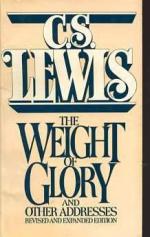
|
| Name: _________________________ | Period: ___________________ |
This test consists of 15 multiple choice questions and 5 short answer questions.
Multiple Choice Questions
1. According to Lewis in his discussion of Pacifism, what sort of society tolerates Pacifists?
(a) Religious.
(b) Conservative.
(c) Anarchist.
(d) Liberal.
2. While talking about duty during wartime, Lewis says that the rescue of drowning men is a duty worth dying for but not worth what?
(a) Encouraging.
(b) Losing money for.
(c) Living for.
(d) Risking war over.
3. Lewis gives the example of Pepys in his discussion of transposition, saying that Pepys experienced the same sensation from all but which of the following?
(a) Sickness.
(b) Music.
(c) Food.
(d) Love.
4. Lewis says, when discussing transposition, that which of the following relationships is one of transposition?
(a) Mind and body.
(b) Individual and society.
(c) Heart and soul.
(d) None of the answers is correct.
5. What is Lewis's response when faced with those who claim the Christian life is a mercenary one?
(a) They are unintelligent.
(b) There are different kinds of rewards.
(c) They are unbelievers and shouldn't be listened to.
(d) They are right.
6. In "Why I am Not a Pacifist", what does Lewis say is the first of three possible ways to interpret the command to turn the other cheek?
(a) Minimizing approach.
(b) Literal interpretation.
(c) Pacifist approach.
(d) Exceptional cases.
7. When discussing the promises of scripture, Lewis states that they can be roughly reduced to how many topics?
(a) Three.
(b) Five.
(c) Twelve.
(d) Seven.
8. Lewis states, when discussing intense aesthetic rapture, that if he tries to catch the feeling it produces, what happens?
(a) Nothing ever happens.
(b) He often loses track of the aesthetic experience.
(c) He gets frustrated.
(d) He grasps only a physical sensation.
9. When discussing mental exercises to defend the scholar against war, what does Lewis give as the first enemy?
(a) Love.
(b) Excitement.
(c) Fear.
(d) Frustration.
10. In "Why I am Not a Pacifist", what does Lewis say is the second of three possible ways to interpret the command to turn the other cheek?
(a) Minimizing approach.
(b) Exceptional cases.
(c) Literal interpretation.
(d) Pacifist approach.
11. In "The Weight of Glory", Lewis says it would be very odd if what people refer to as "falling in love" were to happen where?
(a) In a sexless world.
(b) In heaven.
(c) In hell.
(d) In Christianity.
12. In discussing war's effect on humanity, Lewis says that human life has always been lived where?
(a) Behind closed doors.
(b) Within an unsustainable model.
(c) On the edge of a precipice.
(d) Out in the open.
13. Which analogy does Lewis use when discussing the seeming pointlessness of continuing education during a war?
(a) Talking to a brick wall.
(b) Fiddling while Rome burns.
(c) A race against time.
(d) Not having enough sense to come in out of the rain.
14. In "Transposition", Lewis says that we often feel as though the vision of God will destroy our nature and that this feeling underlies our use of all but which of these words?
(a) Religious.
(b) Holy.
(c) Spiritual.
(d) Pure.
15. In "Why I am Not a Pacifist" Lewis says that were he to be a Pacifist, he would go against the writings of all but which of the following?
(a) Aristotle.
(b) Gandhi.
(c) Cicero.
(d) Plato.
Short Answer Questions
1. Lewis states that we are creatures who are every moment advancing toward either heaven or hell, and that we still spend time on all but which of the following trivialities?
2. While discussing Pacifism, Lewis mentions that he believes only one world religion is truly Pacifist. To which religion does he refer?
3. Lewis states in "Learning in War-time" that St. Paul tells people to do what?
4. In "Why I am Not a Pacifist" Lewis says that nothing should be treated as intuition unless what?
5. In "Why I am Not a Pacifist", Lewis says he believes the art of life consists in tackling _______________ as well as we can.
|
This section contains 644 words (approx. 3 pages at 300 words per page) |

|




